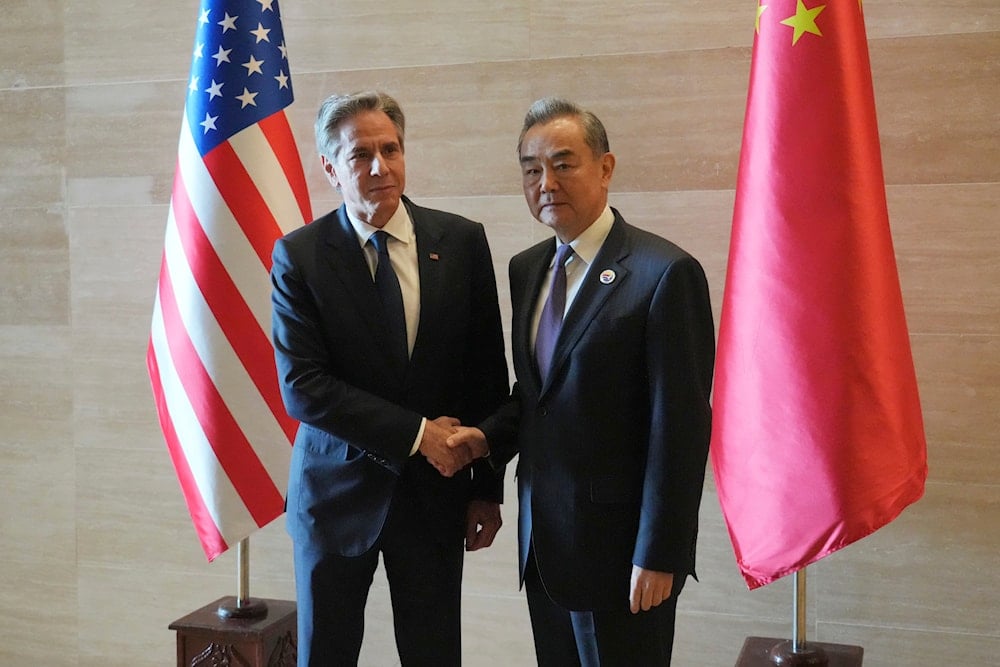China denies aiding Russia in Ukraine war in Wang-Blinken meeting
China denies any involvement in the Ukraine war amid assistance from Washington that it is providing aid to Russia.
-

US Secretary of State Antony Blinken, left, shakes hands with Chinese counterpart Wang Yi on the sideline of the Association of Southeast Asian Nations (ASEAN) Foreign Ministers' Meeting in Vientiane, Laos, July 27, 2024 (AP)
Chinese foreign minister Wang Yi firmly denied allegations that China is aiding Russia in its war effort in Ukraine during a meeting with his US counterpart Antony Blinken in Laos on Saturday.
Wang reiterated Beijing's stance, underlining that his country would "take forceful measures" to defend its interests, a statement issued by the Chinese Foreign Ministry said.
The meeting, which took place in the capital of Laos on the sidelines of the Association of Southeast Asian Nations (ASEAN) summit, highlighted the growing tensions between China and the United States. Wang Yi emphasized that China opposes what it views as unfounded accusations and external pressure.
"China is opposed to being smeared and to false accusations being made against it, does not accept pressure and blackmail, and will take resolute and forceful measures to safeguard its major interests and legitimate rights," Wang stated.
China's economic, diplomatic, and military ties with Russia have strengthened in the wake of the Ukraine war, which was met with condemnation by the US although Beijing and Moscow have long been close partners.
Wang Yi reiterated China's commitment to peace, saying, "China's position on the Ukrainian issue is candid, and we will continue to promote peace talks" between Russia and Ukraine.
In a significant diplomatic gesture, Ukrainian Foreign Minister Dmytro Kuleba made his first visit to China since the war began, underscoring China's influence in the ongoing conflict. President Xi Jinping recently called on the international community to "create conditions" for direct talks between Russia and Ukraine.
'Support' for Russia
The United States and other Western nations accuse China of indirectly supporting Russia's war efforts by supplying equipment that could be used in the conflict. In response, Washington has imposed unilateral sanctions on Chinese companies linked to these activities.
"The US should stop indiscriminate unilateral sanctions and long-arm jurisdiction," Wang Yi told Blinken. Beijing has consistently rejected claims that it supports Russia's actions, maintaining that its position is "open and above board."
NATO has labeled China a "decisive enabler" of the war, a characterization that Beijing vehemently denies. China argues that the United States and its allies are exacerbating the conflict by providing military aid to Ukraine.
China's regular calls for an end to the fighting have been interpreted as a position that, if implemented, would allow Russia to retain control over the Ukrainian territory it has seized.
This came after the Chinese Ambassador to the United States Xie Feng said at an event at the Chinese Embassy that the current crisis in Ukraine was unrelated to and should not affect the relationship between China and the United States.
On the 97th anniversary of the founding of the Chinese People's Liberation Army, Thursday, Feng said, "The Ukraine crisis is not and should not be an issue in China and the United States, and an early ceasefire serves the interests of all states."
Considering the difficulty in developing bilateral relations between China and the US, the ambassador suggested that both nations must "value peace" and avoid confrontation and conflict.
"The China-US relationship is too big to fail. Any conflict or confrontation would cause unimaginable consequences for both countries and the entire world," he affirmed.

 3 Min Read
3 Min Read









